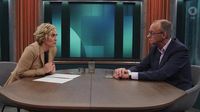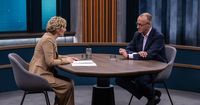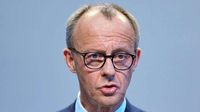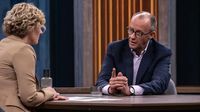On April 13, 2025, Caren Miosga's political talk show took a deep dive into Germany's evolving political landscape, focusing on the future of the country under the leadership of Friedrich Merz, the designated Chancellor. This episode, which aired on ARD, followed Merz's significant interview in Bild am Sonntag, where he stirred controversy by questioning key aspects of the coalition agreement with the SPD.
Miosga, who took over the Sunday night political show from Anne Will on January 21, 2024, invited Merz, the 69-year-old chairman of the CDU, to discuss pressing issues facing Germany. The conversation revolved around the newly agreed coalition agreement among the CDU, CSU, and SPD, which aims to outline government policy for the next four years.
The central theme of the discussion was whether Merz's proposed policy changes would satisfy the expectations of the German populace. "How do you plan to regain the trust of the citizens?" Miosga probed, setting the stage for a frank exchange about the challenges ahead. Merz responded with a blend of confidence and realism, emphasizing the need for a coalition that is not just about quick wins, but about long-term commitment to governance.
In his first major television interview since the coalition negotiations concluded, Merz expressed a strong commitment to economic stability and Germany's international positioning. He stated, "We are not the 'softies' in this coalition," referring to the need for a robust approach to governance that acknowledges the challenges posed by economic fluctuations and international relations.
One of the most contentious points raised during the show was Merz's stance on the minimum wage. Just days after the coalition agreement was finalized, he stated, "A minimum wage of 15 euros by 2026 was not agreed," raising eyebrows among coalition partners and the public alike. This comment reflects the delicate balancing act Merz must perform as he navigates the expectations of both his party and the SPD.
Moreover, Merz hinted that tax cuts for small and medium incomes were also "not fixed," further complicating the narrative of a government ready to deliver on its promises. He noted, "In these volatile times, we should never say never," indicating that while he opposes tax increases, the future remains uncertain.
During the interview, Merz also addressed the issue of higher social security contributions and the anticipated rise in the price of the Deutschlandticket, which could mean less disposable income for many citizens. He acknowledged that these changes would likely lead to many people taking home less net income, a reality that could dampen public sentiment towards his government.
As the conversation shifted to foreign policy, Merz did not shy away from expressing his views on the recent Russian airstrike in Ukraine, which resulted in over 30 civilian deaths. He condemned the attack as a "war crime," highlighting the gravity of the situation and Germany's responsibility to respond decisively. He reiterated his commitment to supplying Taurus cruise missiles to Ukraine, contingent upon coordination with European allies, underlining the importance of a united front in the face of aggression.
"We must ensure that Ukraine receives the support it needs to defend itself," Merz asserted, emphasizing that any military support must be strategically aligned with Germany’s European partners.
On the topic of migration, Merz discussed the need for a more stringent approach, indicating that the number of new asylum applications should be reduced to below six figures to prevent overwhelming local communities. He pointed out that Germany had already accepted 1.2 million refugees from Ukraine, a significant burden that necessitates careful management.
As the discussion wrapped up, Merz's demeanor suggested a blend of optimism and realism. He expressed a desire to inspire the German people, stating, "I can also show emotion!" His call for a positive mindset in the face of challenges resonated with viewers, as he aims to foster an environment where citizens feel motivated to contribute to the economy.
Looking ahead, Merz is scheduled to be officially elected Chancellor on May 6, 2025, a moment he described as a significant responsibility. He remarked, "I stand before a massive task, but I approach it with respect, confidence, and courage." His vision for Germany includes not only immediate reforms but also a long-term strategy that encompasses pension and health reforms, which he believes should be accomplished in the first half of his term.
As Caren Miosga concluded the show, viewers were left with a sense of anticipation regarding Merz's leadership style and the future direction of Germany. With a coalition agreement in place and the challenges of governance ahead, the coming months will be critical in determining whether Merz can effectively navigate the complexities of his role as Chancellor.
The next episode of Caren Miosga is set to air on May 4, 2025, promising further insights into Germany's political developments.








